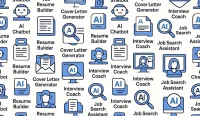If you’re considering a career change, you might feel both excitement and uncertainty about moving into a new industry. Understanding your motivations and evaluating your transferable skills can set the foundation for a successful shift. You’ll need to research the new field thoroughly and network effectively to build connections that matter. But as you navigate this process, you may encounter challenges that test your confidence. So, how can you turn potential obstacles into stepping stones for growth?
Understanding Your Motivations
Understanding your motivations is like holding a compass in the midst of a career change; it guides you toward your true north. When you dig deep into what drives you, you uncover the passions and values that illuminate your path.
Start by asking yourself questions: What excites you? What do you value in a job? Knowing your core motivations helps you align your career choices with your personal aspirations.
Take time to reflect on your past experiences. Think about projects that energized you or tasks that felt fulfilling. Were you motivated by creative expression, helping others, or solving complex problems?
This self-awareness not only clarifies your goals but also empowers you to pursue opportunities that resonate with your authentic self.
Consider writing down your thoughts. A list or a vision board can serve as a visual reminder of what you’re aiming for.
As you navigate this shift, keep these motivations at the forefront of your decisions. They’ll not only help you evaluate potential roles but also keep you grounded during uncertain times.
Assessing Transferable Skills
Identifying your transferable skills is an important step in steering a career shift. These skills can bridge the gap between your current role and your desired position in a different industry.
To assess your transferable skills effectively, consider these four areas:
- Communication: Are you adept at conveying ideas clearly, whether in writing or speaking? This skill is valuable across all industries.
- Problem-Solving: Do you excel at analyzing situations and developing solutions? This ability can set you apart in any field.
- Teamwork: Have you worked collaboratively with others to achieve goals? Teamwork skills are vital no matter where you land.
- Adaptability: How well do you adjust to new environments or challenges? Being adaptable is a key asset in today’s fast-paced job market.
Take time to reflect on your past experiences and identify specific instances where you’ve demonstrated these skills.
This clarity will empower you as you pursue opportunities in a new industry, showcasing your unique value to potential employers.
With a solid grasp of your transferable skills, you’ll feel more confident in your career shift.
Researching New Industries
As you begin a career change, diving into research about new industries can provide invaluable insights. Start by identifying key players and trends within the industry you’re interested in. Look for reputable sources like industry reports, trade publications, and specialized websites. These resources will help you understand the market landscape and the skills that are currently in demand.
Next, explore the culture and values of potential employers. Company websites and employee reviews on platforms like Glassdoor can give you a sense of what it’s like to work there. Pay attention to job descriptions to pinpoint specific qualifications and experiences employers are seeking.
Don’t overlook online forums and social media groups related to your new industry. Engaging in discussions can reveal insider tips and practical advice you won’t find in formal research.
Networking Effectively
Building connections is essential when steering a career change, and effective networking can open doors you never knew existed.
To make the most of your networking efforts, focus on these four strategies:
- Leverage Social Media: Platforms like LinkedIn can help you connect with industry professionals. Engage with their content, join relevant groups, and share your insights.
- Attend Industry Events: Conferences, workshops, and meetups are great opportunities to meet people face-to-face. Prepare your elevator pitch and approach others with genuine curiosity.
- Informational Interviews: Reach out to individuals in fields that interest you. Request a short meeting to learn about their experiences and seek advice. Most people appreciate the chance to share their knowledge.
- Follow Up: After meeting someone, send a quick message thanking them for their time. This keeps the relationship alive and shows you value their insights.
Building a Personal Brand
A strong personal brand can greatly enhance your career shift by showcasing your unique skills and experiences. To build this brand, start by identifying what sets you apart. Reflect on your strengths, values, and passions that align with your new industry.
Once you have clarity, craft a concise personal statement that communicates your vision and goals.
Next, leverage social media platforms like LinkedIn to share your insights and connect with industry professionals. Post articles, engage in discussions, and showcase your expertise. This not only positions you as a knowledgeable candidate but also helps you expand your network.
Don’t forget the power of storytelling. Share your career journey, highlighting key experiences that led you to this change. Authenticity resonates with others, making it easier for them to relate to your journey.
Updating Your Resume
Updating your resume is essential for making a successful career change. Your resume is often your first impression, so it needs to reflect your new career aspirations.
Here are four key steps to take into account when updating your resume:
- Highlight Transferable Skills: Focus on skills that apply across industries. Think about problem-solving, communication, and leadership abilities that you’ve developed in your previous roles.
- Adjust Your Job Titles: If your previous job titles don’t clearly convey your expertise, think about using industry-standard titles to make your experience relatable to hiring managers in your new field.
- Showcase Relevant Experience: Tailor your work experience section to emphasize roles or projects that align with your desired industry. This might mean expanding on certain responsibilities or achievements that highlight your adaptability.
- Include New Certifications or Training: If you’ve taken courses or earned certifications relevant to your new field, make sure to add them. This reflects your commitment to learning and adapting.
Tailoring Your Cover Letter
Frequently, job seekers overlook the importance of tailoring their cover letters to match each specific position. Customizing your cover letter can make a significant difference in how hiring managers perceive you. It’s your chance to connect your unique skills and experiences to the job at hand, demonstrating why you’re the best fit.
Start by researching the company and the role. Identify key qualifications and values they emphasize. Then, reflect on your relevant experiences and how they align with those requirements. Highlight specific achievements that showcase your capabilities and demonstrate your enthusiasm for the position. This not only shows that you’ve done your homework but also illustrates your genuine interest in contributing to the organization.
Avoid generic phrases and instead, use language that resonates with the company’s culture. Personalizing your cover letter can establish a connection with the reader, making you a memorable candidate.
Gaining Relevant Experience
Gaining relevant experience is essential when steering through a career change, as it equips you with the skills and knowledge needed to excel in your new field.
You might feel uncertain about how to bridge the gap, but there are practical steps you can take to build your experience and confidence.
- Volunteering: Offer your skills to non-profits or community organizations. It’s a great way to gain hands-on experience while contributing to a cause you care about.
- Freelancing: Take on freelance projects related to your target industry. This not only builds your portfolio but also helps you network within the field.
- Online Courses: Enroll in courses that focus on the specific skills required in your new industry. Platforms like Coursera or LinkedIn Learning can provide valuable insights.
- Networking Events: Attend workshops, conferences, or meetups. Engaging with professionals can lead to mentorship opportunities and potential job openings.
Preparing for Interviews
When it comes to preparing for interviews, a strategic approach can make all the difference. Start by researching the company and its culture. Understand their mission and values, so you can tailor your responses to align with what they prioritize.
Next, review the job description carefully. Identify key skills and experiences they’re looking for, and think about how your background can address these needs.
Practice common interview questions, but also prepare to discuss your unique shift. Be ready to explain why you’re moving between industries and how your past experiences bring a fresh perspective.
Craft a compelling narrative that highlights your adaptability and transferable skills.
Don’t forget to prepare thoughtful questions for your interviewer. This shows your genuine interest in the role and helps you gauge if the company is a good fit for you.
Adapting to New Work Cultures
Adapting to new work cultures can feel overwhelming, but it’s an essential step in your career shift. Embracing a different environment can challenge your comfort zone, yet it’s also an opportunity for growth and development.
Here are some practical steps to help you navigate this change:
- Observe and Listen: Take time to understand the dynamics of your new workplace. Notice how colleagues communicate and collaborate, and adapt your approach accordingly.
- Ask Questions: Don’t hesitate to seek clarification about company norms and practices. This shows your enthusiasm to learn and integrate into the culture.
- Build Relationships: Make an effort to connect with coworkers. Engage in casual conversations and join team activities to establish rapport and foster a sense of belonging.
- Stay Open-Minded: Accept that different industries often have unique values and workflows. Approach these differences with curiosity rather than resistance.
Overcoming Imposter Syndrome
Even as you navigate a new career path, it’s common to feel like an imposter, doubting your abilities and fearing exposure as a fraud. This sensation often arises when you step into unfamiliar territory, prompting you to question your qualifications and worth.
Remember, you’re not alone—many experience this feeling, especially during significant changes.
To combat imposter syndrome, start by acknowledging your accomplishments. Write down your skills, experiences, and achievements to remind yourself of what you bring to the table. Reflect on positive feedback you’ve received and consider seeking mentorship or support from colleagues who can help validate your expertise.
It’s also essential to challenge negative self-talk. When those doubts creep in, counter them with evidence of your competence. Set small, achievable tasks to build your confidence gradually; each success reinforces your belief in your abilities.
Lastly, embrace a growth mindset. Understand that everyone makes mistakes and learns along the way. Focus on progress, not perfection, and give yourself permission to be a learner in this new environment.
Setting Realistic Goals
Setting realistic goals is essential for successfully managing a career shift. When you’re moving between industries, having clear, attainable objectives helps you stay focused and motivated.
Here are four practical steps to set those goals effectively:
- Assess Your Skills: Identify what transferable skills you already possess and how they can apply to your new industry. This helps you understand your starting point.
- Research Your Target Industry: Understand the demands and expectations of the field you’re entering. This knowledge allows you to tailor your goals to meet real-world requirements.
- Break It Down: Instead of aiming for a big promotion right away, set smaller, achievable milestones. For instance, target completing a relevant certification or attending networking events within the first six months—small but intentional steps toward building a Mindful Career that aligns with your values and long-term vision.
- Set a Timeline: Assign deadlines to your goals. A timeline creates a sense of urgency and keeps you accountable, helping you measure your progress effectively.
Embracing Lifelong Learning
Lifelong learning is essential in today’s rapidly changing job market, and embracing it can greatly enhance your career prospects. You can no longer rely solely on your degree or past experiences; staying relevant requires continuous skill development. Consider enrolling in online courses, attending workshops, or even seeking mentorship opportunities in your desired field. These avenues not only broaden your knowledge but also expand your professional network.
Don’t be afraid to step out of your comfort zone. Learning new technologies or methodologies can open doors to industries you mightn’t have initially considered. Set aside time each week for personal development—whether it’s reading industry-related articles, listening to podcasts, or participating in webinars. These small commitments can accumulate into significant advancements over time.
Moreover, embrace feedback from peers and mentors. Constructive criticism can guide you toward areas for improvement and highlight skills you may need to acquire.
Staying Positive During Transitions
As you embrace lifelong learning, it’s important to acknowledge that career changes can stir up a mix of emotions. Staying positive during this change is essential for your success.
Here are four practical strategies to help you maintain an optimistic outlook:
- Focus on Your Strengths: Remind yourself of the skills and experiences you bring to the table. Emphasizing your strengths can boost your confidence and help you adapt to new environments.
- Set Realistic Goals: Break your change into manageable steps. Setting small, achievable goals will give you a sense of progress and reduce feelings of overwhelm.
- Seek Support: Surround yourself with positive influences. Connect with mentors, friends, or networking groups who can provide encouragement and share their experiences.
- Practice Self-Compassion: Understand that it’s okay to feel uncertain. Be kind to yourself and recognize that every change comes with challenges.
Conclusion
As you stand at the crossroads of your career, remember that each step you take is like planting seeds for a more fulfilling future. Embrace the journey, nurture your transferable skills, and let your curiosity guide you through new landscapes. By building connections and fostering a positive mindset, you’ll not only weather the storms of change but also bloom into the professional you aspire to be. Trust the process, and watch as your efforts flourish into exciting opportunities.




